IN ENGLISH
WHO ARE RUSSIAN INTELLIGENCE OFFICERS IN MONTENEGRIN SERVICES: Neither to the East nor to the West
Objavljeno prije
11 godinana
Objavio:
Monitor online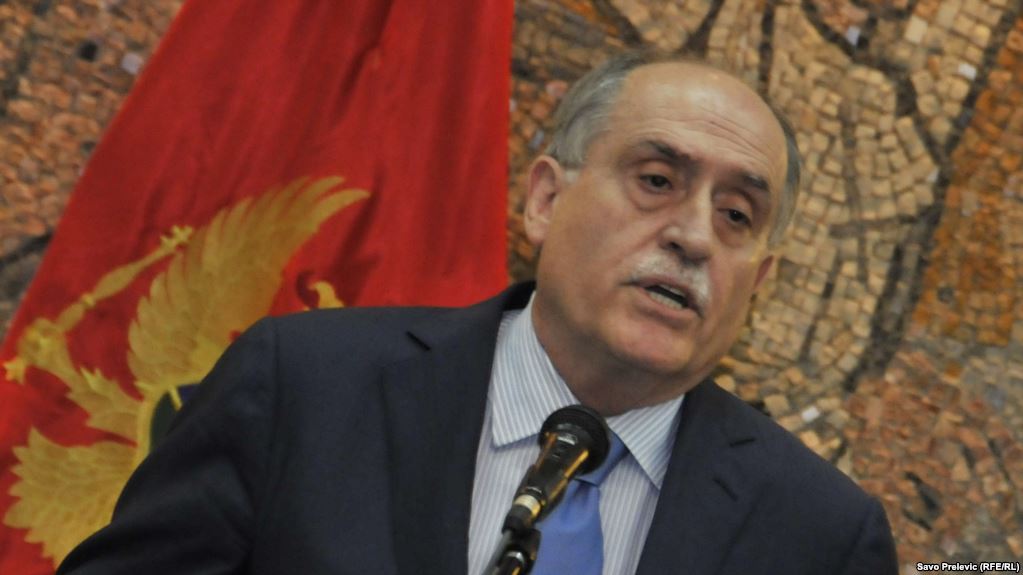
The US Associated Press agency (AP) announced a few days ago that Montenegro’s NATO membership is postponed due to suspicions that Russian spies are working in Montenegrin intelligence services. According to the AP, there is a suspicion that “the number of Montenegrin intelligence officers related to Russia is between 25 and 50”.
This was confirmed by an anonymous senior NATO official for the AP, states the US agency. He confirmed for the AP that Russian spies in Montenegrin services are the main reason for Montenegro’s failure to join NATO and that they are already “taking steps to neutralize their activities, but that it will take time”
The Prime Minister, Milo Djukanović, rejected the allegations that Russian spies were the reason why Montenegro did not receive an invitation to join NATO. He said that the Alliance did not even suggest that such a problem existed: “In all my conversations so far, there were never any indications of the existence of any intelligence officers, not to say 25 to 50 such persons.” Djukanović was immediately disputed.
“We have received findings from NATO that they do not have confidence in our security structures,” said Borislav Banović, the Social Democratic Party MP and a member of the Parliamentary Committee for Security.
Although Djukanović claims that he never received any mention of NATO’s suspicion that there were Russian intelligence officers in Montenegrin services, this had to be the topic of high-level talks. If not for other reasons, then at least for the affair that seriously shook Montenegro two years ago which was related to the accusations of the existence of a parastatal intelligence service in Montenegro led by Djukanović and former Minister of Foreign Affairs, Milan Roćen, formed by “Branko Krga’s personnel”, that was allegedly linked to the Russian services.
Branko Krga is the former Head of the Military Intelligence Service of the Army of Serbia and Montenegro. He belongs to the group of generals who led the Army of Serbia and Montenegro, who were called “the Red Orchestra” due to their ideological stubbornness. According to the Monitor, he and Radoslav Škorić, later chiefs of the Intelligence Administration of the General Staff, were Roćen’s closest associates during his “Moscow years”. With the support of the Montenegrin leadership, Krga was the Head of the General Staff in the period 2002-2005, and in an interview for the Bosnian paper Dani, he acknowledged that he and Roćen “provided contacts” to Radovan Karadzić with the Russians in 1994.”
Two years ago, Nebojša Medojević, the leader of the Movement for Changes (Pokret za promjene) and a member of the Parliamentary Security Committee, was the first to warn that after the referendum, at Roćen’s discretion, Krga’s men were infiltrated and highly positioned in the newly formed Montenegrin army.
Certified Translation from Serbian into English
Medojević then accused the former Minister of Defense, Boro Vucinić, and the former ANB Chief, Duško Marković, that after the referendum they allowed the “infiltration” of the former intelligence officers of the Army of Serbia and Montenegro, connected to Krga and the Russian services, although during the security checks of those ANB officers, headed by Marković, they abstained themselves from statements. Medojević then announced lawsuits against Vučinić and Marković for treason.
In 2006, all members of the 3rd center of the Military Intelligence Agency (VOA) and the 5th center of the Military Security Agency (VBA), who were the military intelligence and counterintelligence service of the Army of Serbia and Montenegro, directly supervised by Belgrade, were subject to statutory legal checks.
According to Medojević, Major Zoran Božovič, Colonel Vladislav Vlahović, Colonel Zoran Bošković, Lieutenant Colonels Darko Burić, Dražen Božović, Miodrag Djukanović and Non-Commissioned Officers Željko Dulović and Željko Rakočević, failed to pass the ANB checks.
Medojević also accused them of being a part of the parastatal parallel service that used former intelligence resources at the orders of Djukanović and Roćen, and used them to unlawfully monitor opposition activists, civil sector activists, foreign diplomats etc. He named Zoran Božović as the head of this parallel service.
These were the officers and non-commissioned officers of the VOA and VBA who were appointed to high military positions after the referendum, which involved contacts with secret information and NATO military operations.
Vlahović was appointed as Montenegro’s military representative to the EU and NATO. Bošković now covers the following positions – a resident military attaché in Berlin and non-resident military attaché for Poland, the Netherlands and Denmark. Darko Burić, Vlahović’s successor as the Head of the former 3rd center of the VOA, became deputy chief of the J-2 (Intelligence-Scouting Department of the General Staff). According to the Monitor, after the referendum, some of the most qualified senior Montenegrin officers who were educated in Zagreb, got the status of “unassigned” in the new Montenegrin Army.
“I doubt that there was an intention at the top of the regime that these intelligence officers continue activities in the Montenegrin Army for the interests of other foreign countries that are not in the NATO alliance,” PzP leader said at the time.
“Djukanović provides confidential NATO information to the Russians, while retaining political support from the West,” Medojević said for the Monitor. He repeatedly stated that, according to Roćen’s instructions, the old pro-Russian Krga’s men were kept in key positions towards NATO. “In the western circles, this did not remain unnoticed. As well as the fact that the key Russian man, Roćen, leads foreign affairs and controls the security and intelligence structures in the Montenegrin army”.
In 2012, Medojević claimed that security assessments of the “Krga’s Red Orchestra” were carried out by ANB officers, Veselin Mazić and Predrag Abramović, after the referendum, that these assessments were not only negative but also later – disappeared from the files of these officers!
Certified Translation from Serbian into English
Božović, Bošković, Djukanović, Burić and Vlahović rejected those allegations, while the Minister of Defense, Boro Vučinić, gave them support at the time. The Ministry of Defense stated that Medojević’s claims should be checked by the state prosecutor. The investigation has never been opened, as far as we know.
Vlahović and Bošković declared at the time that they held security clearance certificates and that they could not have been appointed to high military positions outside the country without them.
“These certificates were issued after Vučinić was transferred from the position of the Minister of Defense to the position of the Head of ANB”, claims Medojević for the Monitor. “The first assessments were negative due to the cooperation with the Russians through Krga.”
A serious investigation was not started even after Medojević’s claim that there were no security assessments in the personal files of these senior officers was later confirmed by the current Military Minister, Milica Pejanović Djurišić.
“If it is true that security assessments have not even been carried out, as according to the Minister Pejanović Djurišić, which, according to my knowledge, is not correct, then Vućinić and Marković are both responsible. If it is true that the assessments were carried out, that they were negative and that they were ignored, only Vučinić was responsible”, said Medojević at the time.
Minister Pejanović Djurišić did not respond to the request of the Monitor to comment on the allegations of the AP on Montenegrin intelligence officers connected to the Russian services. Vojislav Vlahović, the Montenegrin military representative to the EU and NATO, did not respond to the same request either, who was accused of being one of those intelligence officers. Vlahović is a lecturer at the Prime Minister’s Private University of Donja Gorica (UDG).
Geopolitical analyst, Blagoje Grahovac, does not doubt that among the Montenegrin intelligence officers there are those who work for other services.
“The intelligence service, working for certain clans, infiltrated the network of organized crime,” said General Grahovac. “Not only do they work for the needs of Russian secret services, but they work for who knows which services, because when services enter the zone of organized crime and corruption, they are capable of working for anyone.”
Medojević has recently accused the Minister of Defense of having done nothing to reduce the influence of Russian counter-intelligence officers in Montenegrin diplomatic missions, although it was officially announced to Podgorica as one of the conditions for membership in the Alliance. He pointed out to the fact that the high position in her ministry is still covered by Ivan Mašulović, who, according to PzP leader, “was expelled from the ANB for connections with Russian intelligence services, after the intervention of a powerful Western service.” Mašulović is the Assistant Minister of Defense in charge of NATO politics!
At the end of 2011, during the mandate of Boro Vučinić, Mašulović was appointed to this position from which he oversees operational links to NATO, including the Directorate for the Protection of Classified Information, military diplomatic representatives, the Department for International Cooperation and the Department for NATO and the European Union. During the time of Roćen, he managed the Information, Technological and Security Support Service of the Ministry of Foreign Affairs.
According to Medojević, Mašulović has a long-standing cooperation with Krga and Andrej Savić, who teach at the Faculty of Security of Nenad Đorđević, former JUL official of Mirjana Marković.
According to the Monitor, during the visit to the headquarters of ANB as a member of the Defense and Security Committee, Medojević asked the competent officials whether foreign partners, including the US Drug Enforcement Agency (DEA), asked for verification if Masulović “disclosed information” also to Dragan Dudić Fric.
Mašulović denied connections with the Russians and announced a lawsuit against the leader of PZP. He has not filed the lawsuit in the end.
“When the Americans realized what game Djukanović was playing, they requested distancing from the Russians. A very important American official came from Vienna to ask for the dismissal of Roćen. Roćen was dismissed overnight and Djukanović was under strong pressure from the Americans to distance himself from the Russians. This was not easy for him to do, due to the debts towards the Russians,” said a well-informed official for the Monitor.
Milan Roćen announced that he would leave office in the summer of 2012 in the midst of the affair about the Russian structures in the new army. “There are no more challenges in diplomacy” – this was his explanation for the resignation.
“Djukanović’s relations with the Russians include the economy, politics, private business sector and security intelligence. A particularly important detail is that the former Chief of KGB, Viktor Ivanjenko, built the hotel Splendid. FSB operational centers for Montenegro and the Adriatic region were located in the Splendid Hotel and KAP. One of the directors of KAP, Kuznetsov, was a resident of FSB for Montenegro”, Medojević said for the Monitor.
“The Russian mafia provides contacts to the Montenegrin mafia with Colombian cocaine producers. A transnational cocaine cartel is created, based in the Splendid Hotel, with Djukanović’s political support, money laundering logistics that goes through Stanko Subotić, ANB protection and under the auspices of the FSB”, says the leader of the PZP. “Finally, after growing pressures from the Americans, Djukanović pushes KAP into bankruptcy, introduces sanctions to Russia that no one has asked from Montenegro, expressly adopts the law on ANB without announcement and public debate. These are just some of the panic movements of the regime to make up for the years of double, parallel ties with NATO and Russia.”
Djukanović’s games always come at a high price which we need to pay.
Milena PEROVIĆ KORAĆ
Komentari
IZDVOJENO
IN ENGLISH
GRENELL’S (UN)OFFICIAL VISIT TO WESTERN BALKANS: Backroom Deals in Montenegro Again
Objavljeno prije
4 mjesecana
18 Augusta, 2025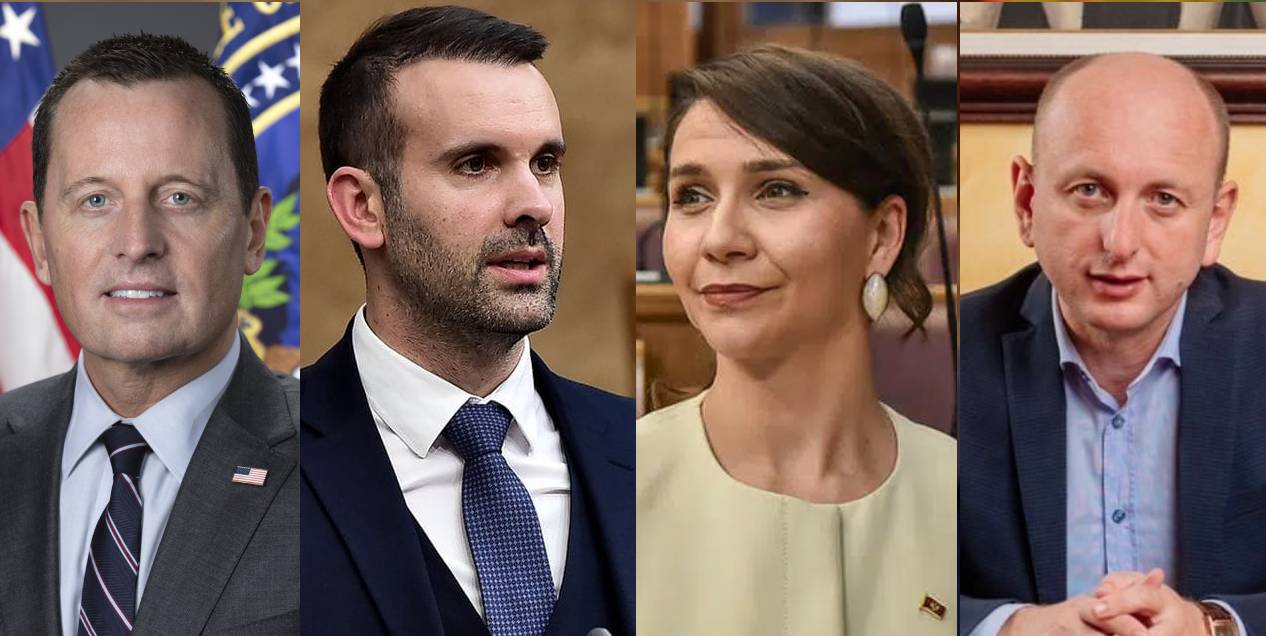
Richard Grenell, former U.S. envoy for the Serbia–Kosovo dialogue and once a powerful figure in Donald Trump’s first administration, reappeared in the Balkans this August on what was labeled an “unofficial visit.” His meetings and media appearances, however, looked suspiciously like an improvised diplomatic tour. Still, regional interlocutors who interacted with Grenell during his visit say that his vocabulary and tone sounded like that of an envoy on official mission, though he never formally claimed such a role. He even hinted, indirectly, that next year he would be back in a far more powerful position — effectively pitching himself
Last Thursday afternoon, Antena M reported that Milorad Dodik, the recently convicted president of Republika Srpska (RS), met with U.S. special presidential envoy Richard Grenell at the One and Only hotel in Portonovi, Montenegro. While authorities in Banja Luka did not confirm the meeting, it was notable that a rally organised by Dodik’s party (the Independent Social Democrats), originally planned as a protest related to his court verdict, was abruptly canceled. Antena M further reported that an unnamed Republican congresswoman was present at the meeting. No Montenegrin officials were involved or played any role in organising the encounter at the resort near the city of Herbage Novi.
However, Monitor received information, which could not be independently verified, suggesting that Grenell also met with Montenegro’s Prime Minister Milojko Spajic and Minister Majda Adzovic on the same day. Allegedly, discussions were uncomfortable and centred around recent turbulence related to airport concession deals in Montenegro. Officials close to the prime minister denied that any such meeting took place, while Minister Adzovic did not answer inquiries.
Earlier, on July 19, Nik Gjeljoshaj who simultaneously serves as Deputy Prime Minister, Economic Development Minister, and chair of the commission overseeing airport concessions informed the public that he had met with Grenell in Washington. In a statement from the U.S., he expressed gratitude to Grenell as “a great friend of the Balkan countries,” and requested support for the country’s accession toward European Union and stronger ties with the United States. During his U.S. visit, Gjeljoshaj claimed to have met in an official capacity with the FBI Director and his “senior leadership team.” Discussions were said to revolve around “the essential importance of upholding the rule of law to attract investments from Western countries and the U.S.” However, the Government publicly denied sending him and said that Gjeloshaj traveled to the U.S. privately. The Deputy PM did not provide any photographic evidence of these meetings. Before his trip, Mr Gjeloshaj was visibly dissatisfied with the tender outcome and the failure of the U.S.–Luxembourg bidder for the airport concessions that he was in favour of.
The day after the Portonovi meeting with Dodik, borba.me reported that on the evening of August 8 “in one Montenegrin coastal town”, Milan Knezevic, the leader of the Democratic People’s Party (DNP) met with Grenell. The meeting reportedly lasted nearly two hours, marked by open dialogue and exchange of of views.
The portal, considered an informal outlet of the pro-Serbia and pro-Russia “For the Future of Montenegro” (ZBCG) coalition, reported that Knezevic “detailed to Grenell the current political situation” – including internal relations in the government and various security, economic and international challenges. The interlocutors agreed “to continue communication and exchange of experiences,” with a prospect of a follow-up meeting in the future .
After departing Montenegro, Grenell continued on to Croatia. He shared on Instagram a photo of him posing with friends in the old town of Dubrovnik. The same day the Kosovar portal Gazeta Express reported that during his stay in the Western Balkans, Grenell met with Shkëlqim Devolli, a shareholder of the prestigious Devolli Corporation, founded by his father Ibrahim Devolli. Shkëlqim Devolli is a regular visitor to the U.S., often seen with influential figures like Republican senators Roger Wicker and Ted Cruz, Texas Governor Greg Abbott, and CIA Director John Ratcliffe.
Gazeta Express highlighted that the main topic of discussion was “stimulating economic growth in Kosovo through foreign investment.” It also noted that Grenell “confirmed the Trump administration’s continued commitment to supporting Kosovo and the Western Balkans,” thus promoting peace, stability, and prosperity. Just like with Knezevic and borba.me, the Gazeta Express account carries an official-sounding narrative, with the identical promise that the parties will “continue the dialogue and explore concrete ways to implement joint projects that would bring sustainable economic benefits and strengthen U.S.–Kosovo relations.” Although the location of the meeting was not disclosed, according to Monitor’s information, Grenell visited the Albanian seacoast prior to coming to Montenegro. In Albania he held a series of meetings with government officials and gave an interview to Klan Kosova – published on August 9.
Allegedly, Grenell was also seen in the region with Serbian Minister of Finance Sinisa Mali. It’s worth recalling that at the end of October 2023, Serbian President Aleksandar Vucic awarded Grenell the Order of the Serbian Flag, First Degree, for “outstanding merits in developing and strengthening peaceful cooperation and friendly relations between Serbia and the United States.” A similar decoration had been awarded to him by Kosovo three years earlier.
Still, the meetings with Albanian officials were not publicized—partly due to uncertainty over Grenell’s status, as he is on poor terms with key figures in President Trump’s administration—Secretary of State Marco Rubio and Trump’s chief of staff Susie Wiles. Grenell’s great influence during Trump’s first mandate is a thing of the past, at least for now, according to U.S. press reports. His actual job at this moment is acting director of the John F. Kennedy Center for the Performing Arts.
Regional interlocutors who were in Grenell’s circle during the visits say his vocabulary sounded as if he were on an official mission, even though he never formally said so. He also indirectly suggested that next year he would hold a significantly higher position than now, thus pitching himself in the region.
When asked whether Grenell was acting in an official capacity in Montenegro and whether it had mediated the meeting with Dodik, the U.S. Embassy in Podgorica referred Monitor to the State Department’s European desk. After the same inquiry, the State Department replied that Monitor should contact Grenell’s office directly. No response arrived prior to this publication. Unofficially, Washington sources told Monitor that the State Department had nothing to do with Grenell’s regional visit and that he was acting as a “freelance”.
Regardless of Grenell’s current status or his career’ trajectory, a big question remains as to how prepared Montenegro is for increasingly unpredictable international relations. So far, bilateral relations between Spajic’s government and the United States have not been impressive. A week ago, U.S. Secretary of State Rubio received Serbian Foreign Minister Marko Djuric—formerly Serbia’s ambassador in Washington, who built a strong Serbian caucus in the U.S. Congress. Rubio announced a “strategic dialogue with Serbia” for the end of the year. This is a process the State Department often carries out to strengthen bilateral relations. It entails high-level discussions on a wide spectrum of topics—defence, security, energy. Djuric emphasized that Serbia requested U.S. government support for issues important to Belgrade, and that his trip to Washington was significant for repositioning Serbia with the new administration. There’s no doubt that Montenegro is on Serbia’s top priorities list.
From the Montenegrin side, however, the current ambassador to the U.S. and the government seem largely indifferent to the disappearance of the Montenegrin caucus and show little effort in building strong ties with Trump’s administration. Previous head of mission in Washington, Nebojsa Todorovic, repeatedly briefed the government and foreign ministry well before the presidential elections that Trump’s return was inevitable and to prepare for it. Even President Jakov Milatovic’s visit to Ohio for the NATO Parliamentary Assembly meeting in Dayton (23-26 May), to mark 30 years of the Dayton Peace Agreement, was poorly prepared. Neither the embassy nor the foreign ministry knew that the U.S. state delegation would only be present on the first day in Dayton. Only thanks to intervention by the former ambassador did Milatovic’s delegation arrive a day earlier. That paved the way for Milatovic’s meeting with Deputy Secretary of State Christopher Landau—which, at such a gathering and outside the capital, carried considerable significance. Similar mistakes by the foreign ministry, ambassadors, and chargés d’affaires have also occurred in European capitals, with serious oversights about dates and availability of European officials.
The lack of serious diplomatic effort and narrow party interests could cost Montenegro dearly. Neighbouring countries, more skilled in lobbying, may shrewdly exploit this for their own interests—which are often at the expense of Montenegrin interests.
Jovo MARTINOVIĆ
Komentari
IN ENGLISH
Government Summons Ambassadors for Consultations and Instructions: A Foreign Policy Tightrope
Objavljeno prije
8 mjesecina
12 Aprila, 2025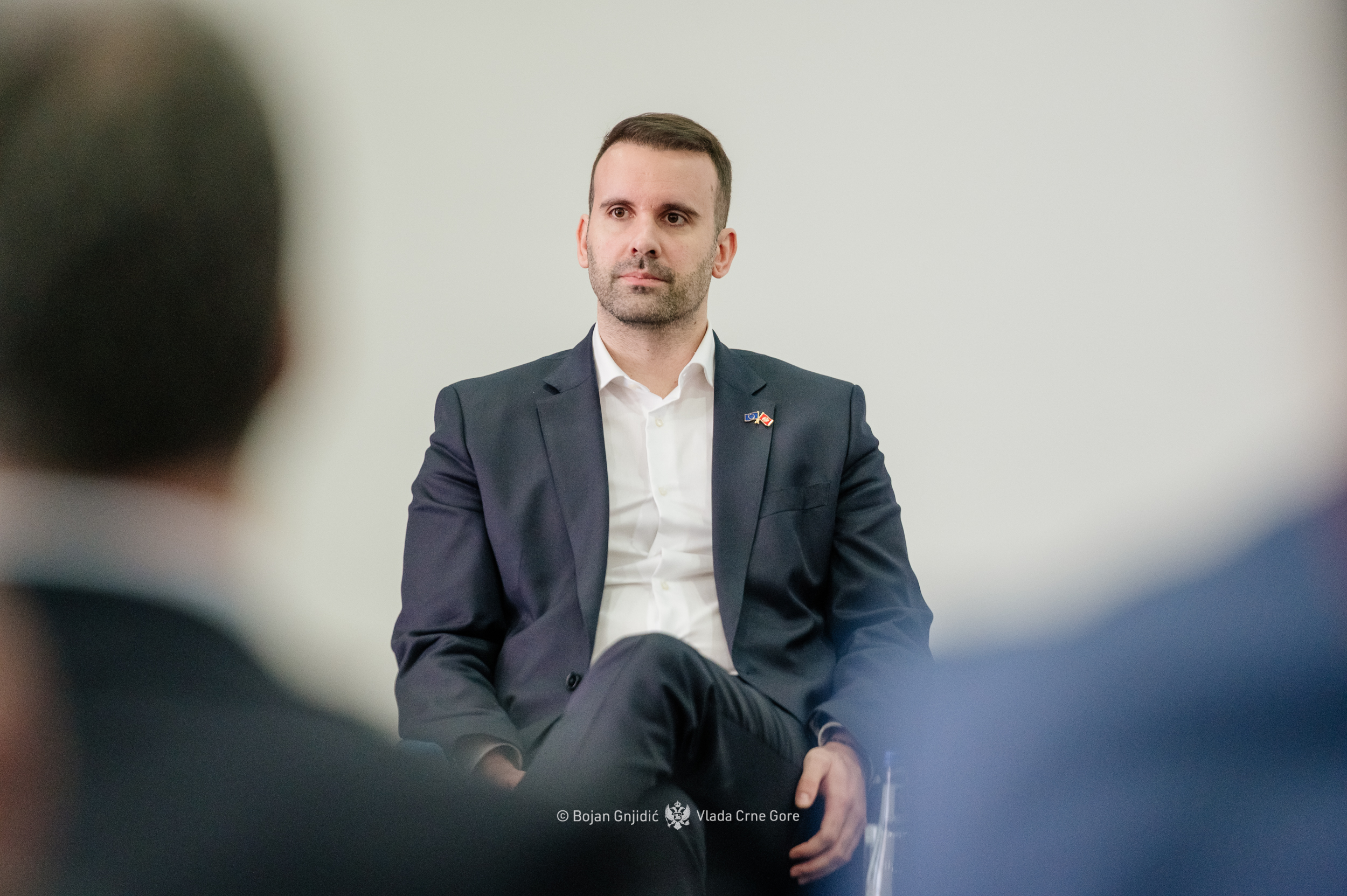
Prime Minister Milojko Spajic recently held a series of individual meetings with Montenegrin ambassadors—from Ukraine to Europe to the United States. Informal sources within the government say that during these meetings, the Prime Minister outlined a new geopolitical landscape shaped by Donald Trump’s return to power in the U.S. and evolving dynamics with the European Union
At the end of February, the Ministry of Foreign Affairs (MFA), led by Minister Ervin Ibrahimovic, summoned nearly all Montenegrin ambassadors stationed in Europe and the U.S. for urgent consultations, set to begin on March 6. The move sparked anxiety among some diplomats, who feared a repeat of the events of November 15, 2024, when three ambassadors were abruptly dismissed.
Monitor finds out that Spajić met separately with key diplomats, including Ukraine-based Borjanka Simicevic and U.S.-based Jovan Mirkovic. However, the concerns of mass dismissals proved unfounded. Instead, sources say the Prime Minister emphasized Montenegro’s continued commitment to the EU and instructed ambassadors to maintain a clear, pro-European stance. At the same time, he advised them against making any public criticisms of the United States or commenting on current rifts between the U.S. and its European allies.
Montenegro’s calibrated position became evident on March 11 at a meeting of top European military officials in Paris, where strategies for supporting Ukraine were discussed following Washington’s announcement of a suspension in military aid. The U.S. was not invited to the Parish meeting as the European leaders were keen to show they could step up independently if needed. Though an AP report initially stated that only Montenegro and Croatia, among NATO’s European members, failed to respond to the invitation, the Prime Minister’s Security and Defense Advisor, Todor Goranovic, told Radio Free Europe (RFE) that Montenegro would indeed participate. However, only the deputy military representative to NATO in Brussels attended because “Chief of General Staff Zoran Lazarevic was officially visiting Bulgaria at the time” – Goranovic explained.
Meanwhile, dissatisfaction is growing within Montenegro’s ruling coalition over Ambassador Mirkovic’s performance (or the lack thereof) in Washington. Tensions reportedly flared after a mid-February meeting with U.S. officials where he suggested that the fall of Serbian President Aleksandar Vucic could weaken some of his Montenegrin puppets. The details of the aforesaid meeting could not be independently confirmed. The subsequent report sent to Podgorica reportedly angered Spajic’s coalition partners from the former Democratic Front (DF). Although the DF was not directly mentioned in the report, its officials saw themselves as being referred to by the ambassador. One of them even retorted that those remarks would be a ground for the ambassador’s recall.
Discontent also emerged from the opposite ideological camp. Metropolitan Boris of the Montenegrin Orthodox Church (MOC) sent a protest letter to Minister Ibrahimovic, complaining that the embassy in Washington did not engage with the MOC delegation during their visit. The embassy, he wrote, failed to meet with them or assist in organizing meetings with U.S. officials. Furthermore, Metropolitan Boris complained that the embassy was “ignorant of some names and institutions that we wanted to reach out to”. He directly blamed the ambassador for the embassy’s dismissive stance.
As Monitor has previously reported, the embassy in Washington is increasingly out of sync with developments in the U.S. The once-prominent Montenegrin Caucus in Congress, which boasted 42 members under former ambassador Srdjan Darmanovic, has effectively dissolved. It’s now reduced to a single member—Congresswoman Chellie Pingree from Maine. Darmanovic had successfully lobbied to counter opposition to Montenegro’s NATO membership, despite concerns over ties of the Djukanović government with foreign criminal networks and Russian intelligence services.
Pingree reportedly sent multiple letters to the embassy criticizing the lack of engagement, but received no response. Monitor also reached out to her office twice for comment but had not received a reply at the time of publication.
Diplomatic affairs aren’t running smoothly in Europe either. In late January, the government approved the appointment of 14 new ambassadors. The list was coordinated with President Jakov Milatovic, whose signature is required for the appointments. Opposition parties and members of the pro-Serbian bloc raised objections, particularly over the inclusion of figures associated with the long-ruling Democratic Party of Socialists (DPS) and former foreign minister Milan Rocen.
One such appointee is Dragana Radulović, a longtime diplomat and former advisor to Prime Minister Dusko Markovic. She was posted to New York as Montenegro’s representative to the UN. She has been in diplomacy since 2000. Internal sources indicate that Veljko Milonjic initially hoped for the post in New York but was instead sent to Warsaw. Milonjic is remembered for his involvement in the so-called “cocaine affair” of 2015 when he was the head of Montenegro’s consulate in Munich. A truck from Munich carrying drugs under diplomatic seal was intercepted at the Austrian border. Though the Ministry of Foreign Affairs denied direct involvement, the incident cast a long shadow. Milonjic denied wrongdoing but was quietly recalled while the Consulate General in Munich was closed down. Milonjic was later appointed to a senior diplomatic post despite the scandal never being prosecuted. The truck driver, Sasha Mugosha, was sentenced to six years in prison. He was released after serving two and a half years and deported to Montenegro.
In March, the government announced that former German Bundestag member Holger Haibach had been appointed as a senior special advisor to Prime Minister Spajic, beginning January 1. Haibach will advise on regional relations in the Western Balkans and support EU accession efforts. His services will be funded by Germany’s Center for International Peace Operations (ZIF). While Haibach’s selection followed a public hiring process, sources in the diplomatic community question his current influence in Berlin. Haibach, a former CDU member of parliament, left office in 2011. Meanwhile, Veljko Kustrov, a Herzegovinian with close ties to Spajic, is considered his main point of contact in Germany.
Perhaps the most controversial diplomatic appointment so far is that of Dusanka Jeknic, a figure from the 1990s linked to the Djukanovic regime and repeatedly associated with cigarette smuggling. However, the Italian prosecutors could not present sufficient evidence against her in court. Jeknic was assigned to the embassy in Turkey after President Milatovic purchased property from her in Podgorica. Milatovic later claimed he had not been consulted on her appointment, stating that such decisions were under the MFA’s jurisdiction. He emphasized that his property purchase had been properly reported to Montenegro’s Agency for the Prevention of Corruption.
Previously, Milatovic had criticized the appointment of Predrag Drecun to lead Montenegro’s Investment Development Fund because of his close ties to the Djukanovic regime.
Montenegro is yet to drive a long and bumpy road before it gets a professional diplomatic network.
Jovo MARTINOVIĆ
Komentari
IN ENGLISH
TWILIGHT OF MONTENEGRIN INTERESTS IN AMERICA: Prayer Breakfast Instead of Real Diplomacy
Objavljeno prije
8 mjesecina
12 Aprila, 2025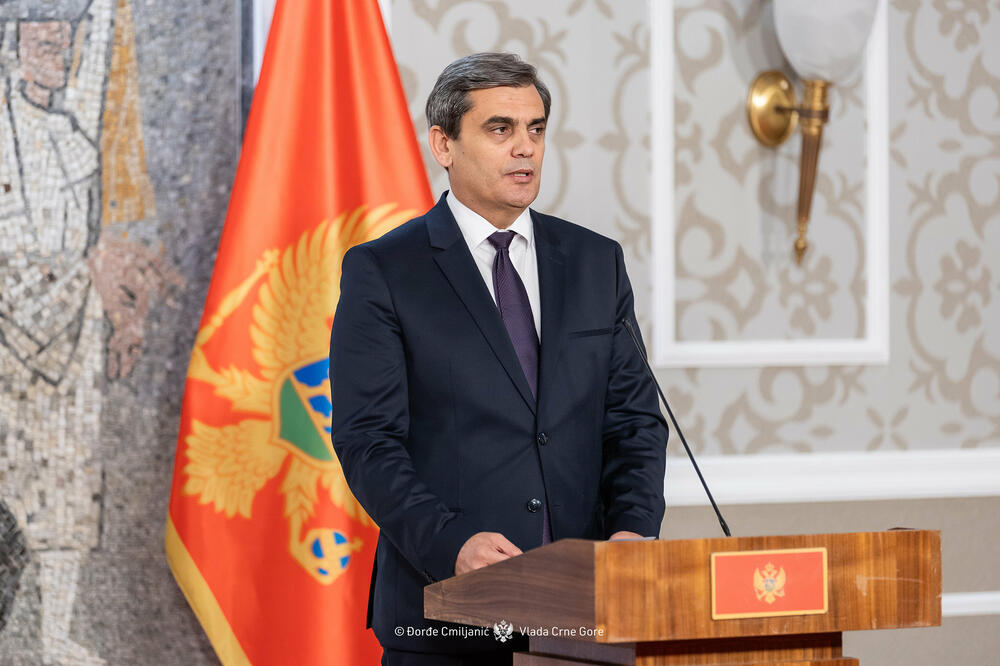
Aside from occasional trips and engagements with diaspora organizations, Montenegro shows little sign of having a coherent lobbying strategy in the United States. With the retirement of Congressman Doug Lamborn, the Montenegrin Congressional Caucus has dwindled to just one representative: Congresswoman Chellie Pingree from Maine
The 73rd annual National Prayer Breakfast in Washington recently took place, drawing more than three thousand leaders and prominent figures from politics and civil society from around the globe. Over the course of two days, participants had opportunities to network and exchange ideas at the Hilton Hotel, under the official patronage of the U.S. President.
Invitations were extended to a broad range of Montenegrin officials, including Prime Minister Milojko Spajic, Foreign Minister Ervin Ibrahimovic, Deputy Prime Minister for Economic Policy Nik Djeljoshaj, Minister of Urban Planning Slaven Radunovic, Minister of Transport Maja Vukicevic, and Minister for Human and Minority Rights Fatmir Djeka. Parliamentary invitees included many MPs, both from the opposition and the majority. Former President Milo Djukanovic and his close aide Branimir Gvozdenovic received invitations as well as several other ex officials. Also in attendance was Vijesti columnist and co-founder Zeljko Ivanovic—reportedly the only one whose travel wasn’t funded by taxpayers.
Branimir Gvozdenovic is often featured in pro-DPS (Democratic Party of Socialists) media as a regional liaison for the Prayer Breakfast. However, his name is absent from the official records of the event’s organizing foundation. Meanwhile, the Montenegrin delegation was accompanied by support staff including security, administrative personnel, and translators — necessary, since only Minister Vukicevic speaks fluent English. Translation was required for Djukanovic, Gvozdenovic and most MPs.
The cost of attending the Prayer Breakfast—including registration fees, three nights in a hotel, airfare, and daily allowances (currently €112 per day) — typically totals around $3,000 per person. When accompanying staff is added, the total bill reaches into the tens of thousands of euros. Out of the entire group, only Ministers Ibrahimović and Djeka were scheduled for official meetings at the U.S. State Department.
Minister for the Diaspora Adem Azemovic, representing the Bosniak Party, made his second trip to the U.S. in a month, accompanied by two associates. In late December, he met with Naser Nika, head of the Albanian-American Association of Staten Island. After the New Year he returned to meet him again. When asked why a second meeting was necessary, the Ministry explained that the first encounter had been brief, and the second was based on an official invitation. The association, which includes Albanian Montenegrins living in Staten Island, was praised for promoting Montenegro in New York.
Azemovic also visited the New York State Assembly, which is reportedly considering hosting Montenegro’s Independence Day celebration. His office described this as an opportunity to mark one of the country’s most significant holidays in a high-profile setting. Interestingly, Montenegro’s Independence Day was already celebrated at New York City Hall on May 23, 2024, in an event organized by the Albanian-American Association of Ulcinj. That celebration included Montenegro’s Consul Amer Cikotic and the Association’s president Dzelal Lanica. Nika had publicly criticized the event on Facebook, claiming that it misrepresented interethnic relations in Montenegro and highlighted Serbian political influence via Serbian President Vucic-backed factions.
Despite these diaspora engagements, there is little to suggest that Montenegro has any serious lobbying efforts in Washington—particularly with key decision-makers. Nebojsa Medojevic, leader of the Movement for Change (PZP), remarked that “Montenegro simply failed to grasp the magnitude and significance of political changes occurring in the U.S.”
“The current ambassador —Professor Jovan Mirković is openly anti-Trump and a personal ally of Aco and Milo Djukanovic” Medojević stated. “He has no meaningful contacts in Washington and no ideological alignment with the current direction of U.S. politics, so it’s unclear who or what he’s even representing.” He went on to question the competence and professionalism of the current government’s foreign policy team.
Interestingly, Nebojsa Todorovic, the former chargé d’affaires in Washington, had warned the Ministry of Foreign Affairs (MFA) and the government in late 2023 to prepare for a potential return of Donald Trump.
Since arriving in Washington in mid-September, Ambassador Mirkovic has maintained a notably low profile. His biography reveals he spent several years in Russia during the early 1990s—the same period when Milan Rocen was serving as minister-counselor at the Yugoslav embassy. Sources claim that Mirkovic has family ties in Russia and is known for his longstanding loyalty to the Djukanovic regime. Neither Djukanovic nor his Democratic Party of Socialists (DPS) have ever renounced their 2011 strategic cooperation agreement with Putin’s United Russia. In fact, the DPS publicly reaffirmed its pride in these ties in Parliament last year.
With the departure of Doug Lamborn—one of the Montenegrin Caucus’s co-chairs—the group now counts only a single member: Congresswoman Chellie Pingree. Meanwhile, Serbia has been actively growing its influence. Foreign Minister Marko Djuric, a former ambassador to Washington, has built up the Serbian Caucus to nearly 40 members. Djuric even boasted that Serbia, though not a NATO member, has stronger U.S. ties than Montenegro.
Some claim that Serbia pressured Podgorica through influential regional businessmen into sending a low-impact figure to Washington. The contrast with past Montenegrin diplomacy is stark: Under Ambassador Srdjan Darmanovic, the Montenegrin Caucus had grown to 42 members, surpassing even the Albanian caucus. Darmanovic worked closely with Congressman Mike Turner to gain U.S. support for NATO accession—despite Djukanovic’s regime then-notorious links to organized crime and Russian intelligence services.
Efforts to revive the caucus were briefly relaunched by Nebojsa Todorovic, who during his stint as chargé d’affaires in 2023 helped re-engage 10 U.S. lawmakers, including Turner and other influential committee chairs such as Michael McCaul and Robert Aderholt. For a brief period, Montenegro held a unique status in the Balkans, with three Congressional committee leaders in its caucus.
However, Todorovic has since been recalled, and with him, much of Montenegro’s presence in Washington has faded again into inertia.
This raises uncomfortable questions: Is Spajic’s government reverting to the old practice of conducting diplomacy through informal channels and business networks, as seen under Djukanovic and his top advisor Rocen? At the time, oligarchs like Oleg Deripaska and other Putin loyalists were reportedly enlisted to lobby for Montenegro in the West.
That line of approach came at a steep cost to the country—and its reputation.
Jovo MARTINOVIĆ
Komentari
Kolumne
-

DANAS, SJUTRA / prije 6 dana
Saučesnici
Zoran Radulović
-

ALTERVIZIJA / prije 6 dana
Crazy But Not Stupid
Milan Popović
-

DANAS, SJUTRA / prije 2 sedmice
Satovi unazad
Milena Perović
-

DUHANKESA / prije 2 sedmice
Trazimahov zakon pravednosti nepravde
Ferid Muhić
-

DANAS, SJUTRA / prije 3 sedmice
Đedovina
Milena Perović

Novi broj
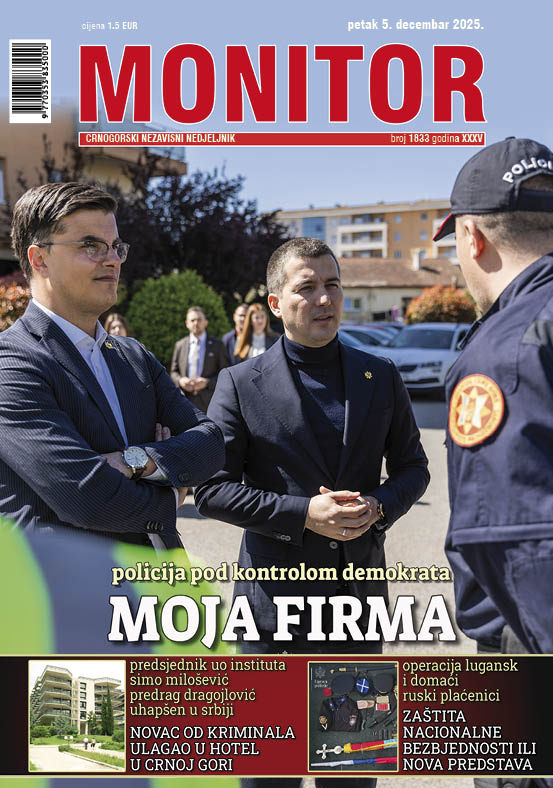

POLICIJA POD KONTROLOM DEMOKRATA: Moja firma

OPERACIJA LUGANSK I DOMAĆI RUSKI PLAĆENICI: Zastita nacionalne bezbjednosti ili nova predstava

BUDVA: BUDŽET, POLITIKA I CRKVA: Razlaz dva predsjednika – Jovanovića i Odžića?
Izdvajamo
-
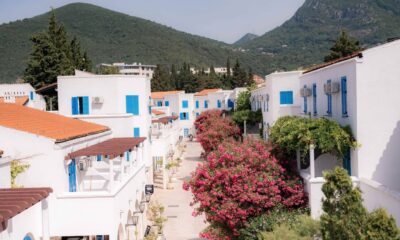
 DRUŠTVO4 sedmice
DRUŠTVO4 sedmiceGLASNA TIŠINA OKO PRIVATIZACIJE BUDVANSKE RIVIJERE: Vlada se ne oglašava – radnici protestuju
-

 HORIZONTI3 sedmice
HORIZONTI3 sedmiceSARAJEVSKI SAFARI U SUDNICI ITALIJE: Lovci bez duše
-
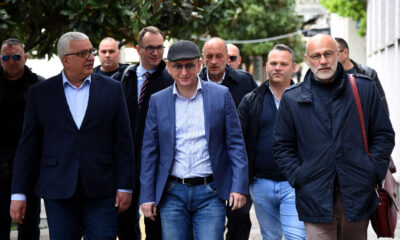
 DRUŠTVO4 sedmice
DRUŠTVO4 sedmiceSLUČAJ DRŽAVNI UDAR: Ponovo pred pravosuđem
-

 Izdvojeno4 sedmice
Izdvojeno4 sedmiceMJESEC DANA AMERIČKOG PLANA NA BLISKOM ISTOKU: Smrt u doba primirja
-
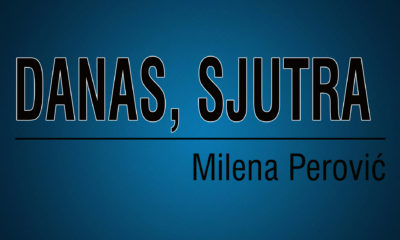
 DANAS, SJUTRA4 sedmice
DANAS, SJUTRA4 sedmiceSPC, prva grana vlasti
-
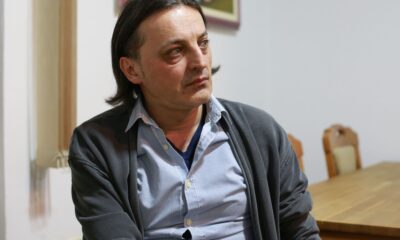
 INTERVJU3 sedmice
INTERVJU3 sedmiceDRAGO BOJIĆ, TEOLOG I FILOZOF, SARAJEVO: U ljude se uvlači strah, jer ne znaju što donosi sjutra
-

 ALTERVIZIJA4 sedmice
ALTERVIZIJA4 sedmiceKoncentraciona vlada ili vlada političkog centra ( II)
-
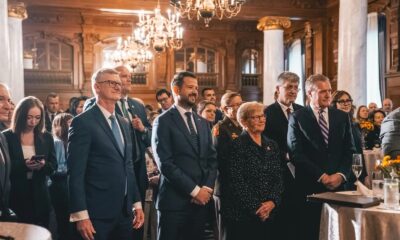
 FOKUS3 sedmice
FOKUS3 sedmiceCRNOGORSKA DIPLOMATIJA, LOBISTI I RASLOJAVANJE U SRPSKOM SVETU: Vrijeme tranzicije






